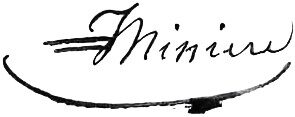I first became aware of John Lynd when I was researching my 5th great grandfather, James Minyard, who operated under the pseudonym Joseph Miniere from 1796 to 1826 in the locations of Baltimore MD, Manhattan NY, Charleston SC, New Orleans LA and British-occupied Jamaica. Lynd was a notary public in New Orleans from 1801 until his death in 1820. Lynd notarized numerous documents for Miniere, among them being transactions with Beverly Chew and Jacques Villere.
1768 – British-occupied North America (Probably Natchez, MS)
In the proceedings of the bankruptcy of John Barrell, a document titled “Fleming v Lynde” is exhibited in court.
Tennessee Territory – Date Unknown
John Lynd marries Martha Flemming
1768-1779 – Tryon (Rowan) County, North Carolina
John Lynd appears on the tax list living in the Crawford district of present-day Rowan County, NC.
1773-1774 – Quebec, Canada
In an account of the proceedings of the British and other Protestant inhabitants of Quebec, John Lynd and others petition Lieutenant Governor Hector Theophilus de Cramahé in order to obtain a House of Assembly in the said Province.
Source
November 4, 1774 – Quebec
John Lynd and others submit a petition of grievances to King George III in response to a recent Act of Parliament.
August 30, 1777 – Henry County, Virginia
John Lynd and others take the State Oath of Virginia, renouncing King George III.
Nov. 20, 1778 – Philadelphia, Pennsylvania
John Lynd appears on a Revolutionary War Military Abstract Card File under the command of Captain William Hicks of North Carolina. No dates of active duty are included.
1780 – Philadelphia, PA
John Lynd appears on the tax list in the Mulberry Ward District
1781 – Maryland or Virginia
John Lynd’s property is confiscated for being a Loyalist by the Principio Iron Works, a company owned by Augustine Washington, George Washington’s father.
Jan. 23, 1781 – Rowan County, NC
The will of John Lynd is produced in probate court. James Davidson and Adam Lynd Davidson are named as heirs.
Source
March 10, 1785 – Quebec
John Lynd, Constant Freeman and others petition the Crown for the right of public worship.
Oct. 29, 1785 – Quebec
John Lynd and David Lynd appear on a notary record for “Renunciation”.
April 5, 1786 – Quebec
John Lynd and James Sinclair are appointed to manage the affairs of the late Britannia Frankling.
July 2, 1786 – New York/Quebec
John Lynd corresponds with exiled Loyalist Stephen Tuttle:
“He is happy to hear he will be able to discharge his debt to the writer according to his solemn obligation, this being one of the chief advantages of Masonry”.
Jan. 4, 1787 – Quebec
John Lynd is included on a list of merchants qualified to serve on special juries. David Lynd and C.C. Pinckney sign the court document.
Dec. 4, 1790 – Quebec
John Lynd and James Davidson appear on a notary document for “Agreement”.
Source
November 1796 – Quebec
Samuel de Montmollin loans money in Spanish currency to Louis and Charles Fremont of Quebec with John Lynd appointed as surety.
Source
1799 – Quebec
John Lynd sells two farms located on his estate.
1799 – Quebec
John Lynd appears on a miliary register as a Captain in the British Quebec Battalion.
March 8, 1800 – Quebec
King George III writes to the sheriff of the district of Quebec (James Shepherd), concerning the taking possession of all the property of the Jesuits located in the said district, among them John Lynd.
July 30, 1801 – New Orleans
John Lynd applies for a license to marry Rosetta Ramos.
March 11, 1802 – New Orleans
Daniel Douglas gives John Lynd power of attorney over his estate.
Jan. 29, 1803 – Quebec
John Lynd receives a 400 acre land grant.
October, 1803 – Quebec
Michel Berthelot, Jesuit property agent, writes to George Pyke, secretary of the Jesuit Property Commission, requesting permission to lease the deceased John Lynd’s estate.
November 4, 1803 – Quebec
Curatorship in the vacant estate of the late John Lynd, merchant of Quebec.
November 18, 1803 – New Orleans
George Pollock gives John Lynd power of attorney over his estate.
March 9, 1804 – Quebec
At a meeting of the commission responsible for the administration of Jesuit property, the members discuss the consequences of the death without inheritance of John Lynd, tenant of the Sillery estate.
1807 – New Orleans
Merchant John McDonaugh sells General James Wilkinson $10,000 worth of sugar, which Wilkinson pays in Mexican currency. McDonough is later deposed in court on the matter, with his statement being sworn to Justice of the Peace John Lynd.
Source
July 1, 1811 – New Orleans
Former Marquis de Lafayette Aide de Camp Guy Duplantier files suit against John Lynd, proclaiming Lynd did not pay for goods delivered. The witness, a court clerk, supported Lynd.
December, 1814 – New Orleans
John Lynd and others are abducted by the British while visiting Jacques Villere’s estate. Lynd is then held captive on a British vessel for an unknown period of time.
May 8, 1807 – New Orleans
John Lynd and others publicly support James Wilkinson during the Aaron Burr trial, in which Wilkinson was implicated.
1818
President Thomas Jefferson writes John Lynd regarding his desire to form a colony of exiled Africans.
June 22, 1860
The heirs of John Lynd make a claim for land that Lynd claimed between 1806 and his death in 1820. The claim is listed in “Notices of private land claims filed under Spanish and French grants in Louisiana and Alabama, 1806-1830.“
